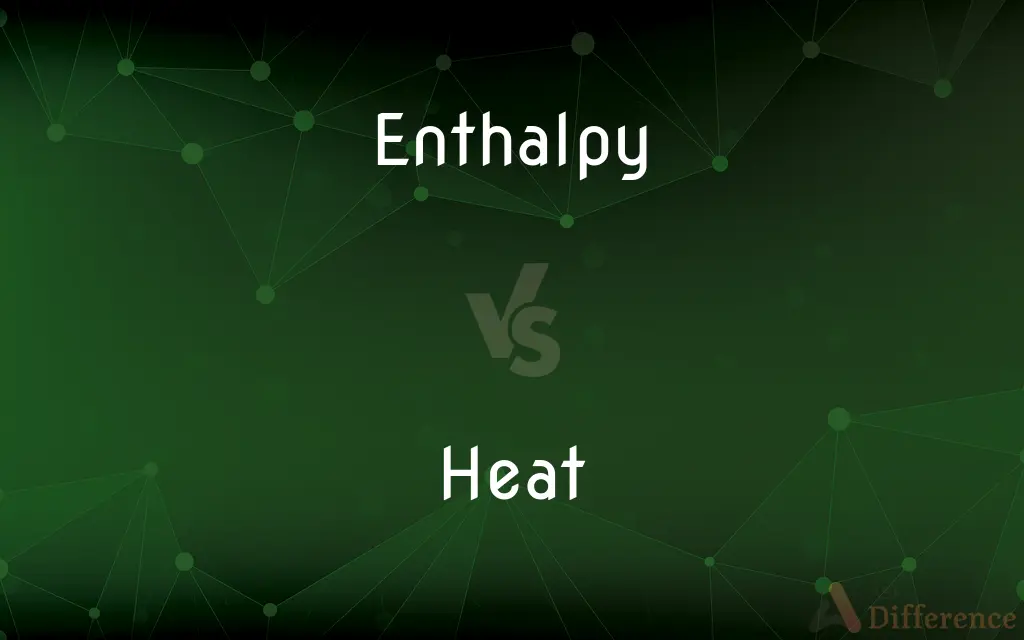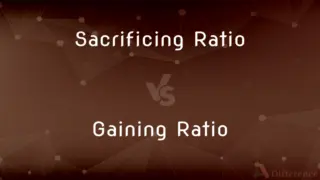Enthalpy vs. Heat — What's the Difference?
By Tayyaba Rehman — Published on October 31, 2023
Enthalpy is a measure of the total energy in a system, while heat is the energy transferred due to a temperature difference.

Difference Between Enthalpy and Heat
Table of Contents
ADVERTISEMENT
Key Differences
Enthalpy and heat, often encountered in thermodynamics, have distinct meanings. Enthalpy represents the total energy content of a system, encompassing both internal energy and the energy associated with pressure and volume. The change in enthalpy during a process (like a chemical reaction) gives insight into the energy exchange that occurs with the surroundings. In contrast, heat refers to the transfer of energy solely due to a temperature difference. Whenever there's a temperature gradient, energy flows from a hotter body to a cooler one, and this energy in transit is called heat.
Though both enthalpy and heat deal with energy, their concepts delineate specific phenomena. Heat is a transient form of energy, only existing during the process of energy transfer. Once the transfer stops and equilibrium is achieved, we no longer discuss heat. Enthalpy, on the other hand, is a state function, meaning it describes the state of a system at any given moment, irrespective of the path taken to reach that state.
One can analogize the difference between enthalpy and heat with a bank account. Think of enthalpy as the total amount of money in an account. This amount can change if money is deposited or withdrawn. Heat, in this analogy, would be analogous to a single transaction – either depositing (adding heat) or withdrawing (removing heat) money.
In practical applications, such as chemistry, the change in enthalpy for reactions indicates whether energy is absorbed or released. When a system absorbs heat from its surroundings, the process is endothermic, and when it releases heat, it's exothermic. It's crucial to remember, however, that not all enthalpy changes result from heat flow. Work and other energy transfers can also affect enthalpy.
Comparison Chart
Definition
A measure of the total energy in a system.
Energy transferred due to a temperature difference.
ADVERTISEMENT
Nature
A state function, describes a system's state.
Transient, exists only during energy transfer.
Representation
Often symbolized as H.
Often symbolized as q.
Units
Typically Joules (J) or calories (cal) in the context of energy.
Same as enthalpy, Joules (J) or calories (cal) in the context of energy transfer.
Causes
Changes due to reactions, phase transitions, mixing, etc.
Solely due to temperature difference.
Compare with Definitions
Enthalpy
An energy measure used in thermodynamics.
Chemists study enthalpy changes to understand reaction energetics.
Heat
The energy transferred between bodies due to temperature difference.
When you touch a hot pan, you feel the heat transferring to your hand.
Enthalpy
The sum of internal energy and product of pressure and volume.
Enthalpy considers both the system's internal energy and its PV work.
Heat
A form of energy in transit.
Once thermal equilibrium is reached, no more heat flows.
Enthalpy
The total energy content of a system.
For combustion reactions, the enthalpy change is often negative.
Heat
Often associated with thermal processes.
On a sunny day, the heat from the sun warms the Earth's surface.
Enthalpy
A state function reflecting a system's energy state.
Given the initial and final states, you can determine the change in enthalpy.
Heat
Not a state function, but a process function.
Heat only describes the energy transfer, not the state of a system.
Enthalpy
A parameter indicating energy exchange with surroundings.
The enthalpy change helps in determining whether a process is endothermic or exothermic.
Heat
In thermodynamics, heat is energy in transfer to or from a thermodynamic system, by mechanisms other than thermodynamic work or transfer of matter. The various mechanisms of energy transfer that define heat are stated in the next section of this article.
Enthalpy
Enthalpy (listen) is a property of a thermodynamic system, and is defined as the sum of the system's internal energy and the product of its pressure and volume. It is a state function used in many measurements in chemical, biological, and physical systems at a constant pressure, that is conveniently provided by the large ambient atmosphere.
Heat
A form of energy associated with the kinetic energy of atoms or molecules and capable of being transmitted through solid and fluid media by conduction, through fluid media by convection, and through empty space by radiation.
Enthalpy
Symbol H A thermodynamic function of a system, equivalent to the sum of the internal energy of the system plus the product of its volume multiplied by the pressure exerted on it by its surroundings.
Heat
The transfer of energy from one body to another as a result of a difference in temperature or a change in phase.
Enthalpy
A measure of the heat content of a chemical or physical system.
, where H is enthalpy, U is internal energy, p is pressure, and V is volume.
Heat
The sensation or perception of such energy as warmth or hotness.
Enthalpy
(thermodynamics) a thermodynamic quantity equal to the internal energy of a system plus the product of its volume and pressure;
Enthalpy is the amount of energy in a system capable of doing mechanical work
Heat
An abnormally high bodily temperature, as from a fever.
Heat
The condition of being hot.
Heat
A degree of warmth or hotness
The burner was on low heat.
Heat
The warming of a room or building by a furnace or another source of energy
The house was cheap to rent, but the heat was expensive.
Heat
A furnace or other source of warmth in a room or building
The heat was on when we returned from work.
Heat
A hot season; a spell of hot weather.
Heat
Intensity, as of passion, emotion, color, appearance, or effect.
Heat
The most intense or active stage
The heat of battle.
Heat
A burning sensation in the mouth produced by spicy flavoring in food.
Heat
Estrus.
Heat
One of a series of efforts or attempts.
Heat
Sports & Games One round of several in a competition, such as a race.
Heat
A preliminary contest held to determine finalists.
Heat
(Informal) Pressure; stress.
Heat
An intensification of police activity in pursuing criminals.
Heat
The police. Used with the.
Heat
(Slang) Adverse comments or hostile criticism
Heat from the press forced the senator to resign.
Heat
(Slang) A firearm, especially a pistol.
Heat
To make warm or hot.
Heat
To excite the feelings of; inflame.
Heat
(Physics) To increase the heat energy of (an object).
Heat
To become warm or hot.
Heat
To become excited emotionally or intellectually.
Heat
(uncountable) Thermal energy.
This furnace puts out 5000 BTUs of heat.
That engine is really throwing off some heat.
Removal of heat from the liquid caused it to turn into a solid.
Heat
(uncountable) The condition or quality of being hot.
Stay out of the heat of the sun!
Heat
(uncountable) An attribute of a spice that causes a burning sensation in the mouth.
The chili sauce gave the dish heat.
Heat
(uncountable) A period of intensity, particularly of emotion.
It's easy to make bad decisions in the heat of the moment.
Heat
(uncountable) An undesirable amount of attention.
The heat from her family after her DUI arrest was unbearable.
Heat
The police.
The heat! Scram!
Heat
One or more firearms.
Heat
A fastball.
The catcher called for the heat, high and tight.
Heat
(uncountable) A condition where a mammal is aroused sexually or where it is especially fertile and therefore eager to mate; oestrus.
The male canines were attracted by the female in heat.
Heat
In omegaverse fiction, a cyclical period in which omegas experience an intense, sometimes irresistible biological urge to mate.
Heat
(countable) A preliminary race, used to determine the participants in a final race
The runner had high hopes, but was out of contention after the first heat.
Heat
A stage in a competition, not necessarily a sporting one; a round.
Heat
(countable) One cycle of bringing metal to maximum temperature and working it until it is too cool to work further.
I can make a scroll like that in a single heat.
Heat
(countable) A hot spell.
The children stayed indoors during this year's summer heat.
Heat
(uncountable) Heating system; a system that raises the temperature of a room or building.
I'm freezing; could you turn on the heat?
Heat
(uncountable) The output of a heating system.
During the power outage we had no heat because the controls are electric.
Older folks like more heat than the young.
Heat
(countable) A violent action unintermitted; a single effort.
Heat
To get a negative reaction from the audience, especially as a heel (or bad character).
Heat
(transitive) To cause an increase in temperature of (an object or space); to cause to become hot often with "up".
I'll heat up the water.
Heat
(intransitive) To become hotter.
There's a pot of soup heating on the stove.
Heat
To excite or make hot by action or emotion; to make feverish.
Heat
To excite ardour in; to rouse to action; to excite to excess; to inflame, as the passions.
Heat
To arouse, to excite (sexually).
The massage heated her up.
Heat
A force in nature which is recognized in various effects, but especially in the phenomena of fusion and evaporation, and which, as manifested in fire, the sun's rays, mechanical action, chemical combination, etc., becomes directly known to us through the sense of feeling. In its nature heat is a mode of motion, being in general a form of molecular disturbance or vibration. It was formerly supposed to be a subtile, imponderable fluid, to which was given the name caloric.
Heat
The sensation caused by the force or influence of heat when excessive, or above that which is normal to the human body; the bodily feeling experienced on exposure to fire, the sun's rays, etc.; the reverse of cold.
Heat
High temperature, as distinguished from low temperature, or cold; as, the heat of summer and the cold of winter; heat of the skin or body in fever, etc.
Else how had the world . . . Avoided pinching cold and scorching heat!
Heat
Indication of high temperature; appearance, condition, or color of a body, as indicating its temperature; redness; high color; flush; degree of temperature to which something is heated, as indicated by appearance, condition, or otherwise.
It has raised . . . heats in their faces.
The heats smiths take of their iron are a blood-red heat, a white-flame heat, and a sparkling or welding heat.
Heat
A single complete operation of heating, as at a forge or in a furnace; as, to make a horseshoe in a certain number of heats.
Heat
A violent action unintermitted; a single effort; a single course in a race that consists of two or more courses; as, he won two heats out of three.
Many causes . . . for refreshment betwixt the heats.
[He] struck off at one heat the matchless tale of "Tam o' Shanter."
Heat
Utmost violence; rage; vehemence; as, the heat of battle or party.
Heat
Agitation of mind; inflammation or excitement; exasperation.
Heat
Animation, as in discourse; ardor; fervency; as, in the heat of argument.
With all the strength and heat of eloquence.
Heat
Sexual excitement in animals; readiness for sexual activity; estrus or rut.
Heat
Fermentation.
Heat
Strong psychological pressure, as in a police investigation; as, when they turned up the heat, he took it on the lam.
Heat
To make hot; to communicate heat to, or cause to grow warm; as, to heat an oven or furnace, an iron, or the like.
Heat me these irons hot.
Heat
To excite or make hot by action or emotion; to make feverish.
Pray, walk softly; do not heat your blood.
Heat
To excite ardor in; to rouse to action; to excite to excess; to inflame, as the passions.
A noble emulation heats your breast.
Heat
To grow warm or hot by the action of fire or friction, etc., or the communication of heat; as, the iron or the water heats slowly.
Heat
To grow warm or hot by fermentation, or the development of heat by chemical action; as, green hay heats in a mow, and manure in the dunghill.
Heat
Heated; as, the iron though heat red-hot.
Heat
A form of energy that is transferred by a difference in temperature
Heat
The presence of heat
Heat
The sensation caused by heat energy
Heat
Intense passion or emotion
Heat
Applies to nonhuman mammals: a state or period of heightened sexual arousal and activity
Heat
A preliminary race in which the winner advances to a more important race
Heat
Utility to warm a building;
The heating system wasn't working
They have radiant heating
Heat
Make hot or hotter;
Heat the soup
Heat
Provide with heat;
Heat the house
Heat
Arouse or excite feelings and passions;
The ostentatious way of living of the rich ignites the hatred of the poor
The refugees' fate stirred up compassion around the world
Wake old feelings of hatred
Heat
Gain heat or get hot;
The room heated up quickly
Heat
Can cause a change in temperature or phase of a substance.
Adding heat to ice causes it to melt.
Common Curiosities
What unit is typically used for enthalpy and heat?
Both enthalpy and heat are often measured in Joules (J) or calories (cal) in thermodynamic contexts.
What initiates the transfer of heat?
A temperature difference between two bodies or systems initiates the transfer of heat.
What does enthalpy measure?
Enthalpy measures the total energy content of a system, including internal energy and the energy related to pressure and volume.
How is heat related to temperature?
Heat is energy transferred due to a difference in temperature, and its addition or removal can change a substance's temperature.
Is heat a state or process function?
Heat is a process function, meaning it describes an energy transfer, not a system's state.
How can one measure the change in enthalpy?
Calorimetry is a common experimental method to measure changes in enthalpy by observing heat exchanges.
How is enthalpy used in chemistry?
Enthalpy is used to understand reaction energetics, determining whether reactions are endothermic or exothermic.
Can heat flow from a colder to a hotter body?
In natural spontaneous processes, heat flows from a hotter to a colder body, not the other way around.
What does a positive heat value signify?
A positive heat value indicates that energy has been absorbed by the system from its surroundings.
Is enthalpy conserved?
Energy, including enthalpy, is conserved according to the first law of thermodynamics, but a system's enthalpy can change via exchanges with its surroundings.
Why is heat not a state function?
Heat describes the amount of energy transferred due to a temperature difference and doesn't specify a system's state.
Are heat and temperature the same thing?
No, while related, heat is energy in transit due to temperature differences, while temperature is a measure of thermal energy.
Can enthalpy be negative?
Yes, a negative change in enthalpy often indicates that a system releases energy, typically observed in exothermic reactions.
What's the relationship between enthalpy and heat in constant pressure processes?
At constant pressure, the change in enthalpy is equal to the heat added or removed from the system.
In what units is heat typically expressed?
Heat is typically expressed in Joules (J) or calories (cal), representing energy transfer.
Share Your Discovery

Previous Comparison
Cost Sheet vs. Production Account
Next Comparison
Sacrificing Ratio vs. Gaining RatioAuthor Spotlight
Written by
Tayyaba RehmanTayyaba Rehman is a distinguished writer, currently serving as a primary contributor to askdifference.com. As a researcher in semantics and etymology, Tayyaba's passion for the complexity of languages and their distinctions has found a perfect home on the platform. Tayyaba delves into the intricacies of language, distinguishing between commonly confused words and phrases, thereby providing clarity for readers worldwide.














































